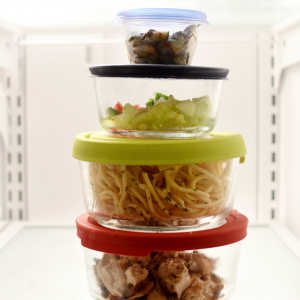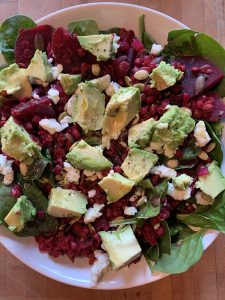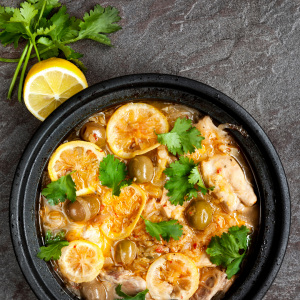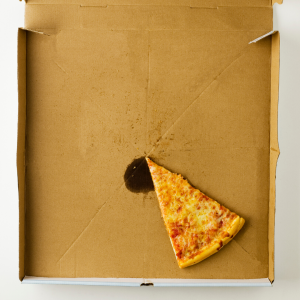 I was at the Yoga Warrior Winter Reset Retreat last weekend to “dish the deets on detox” and a few themes came up whenever talk of cooking arose. One was that no one has any time to cook and the other was how much everyone loved their Instant Pot. So with that and Valentine’s Day coming up, I feel it is time to confess my own love affair … with leftovers! And since I am usually cooking just for two, the Instant Pot and leftovers go hand-in-hand!
I was at the Yoga Warrior Winter Reset Retreat last weekend to “dish the deets on detox” and a few themes came up whenever talk of cooking arose. One was that no one has any time to cook and the other was how much everyone loved their Instant Pot. So with that and Valentine’s Day coming up, I feel it is time to confess my own love affair … with leftovers! And since I am usually cooking just for two, the Instant Pot and leftovers go hand-in-hand!
But I actually plan for leftovers. In fact, leftovers are a meal planning secret weapon to make my life (at least my cooking life) easier. And when providing meal planning services, you can bet that leftovers are a part of the plan for my clients too.
Leftovers get a bad rap. Even their very name makes them seem like discarded, lonely old things that no one wants. But, to me, leftovers are pure gold! As they should be to any time-pressed person out there who wants to eat healthy food. And isn’t that most of us? So, to explain my attraction to leftovers, I’ve put together my top 10 reasons why you, too, should love your leftovers!
Top 10 Reasons to Love Your Leftovers
1. Leftovers save money.
This goes without saying. If you are tossing out leftover food, you are tossing out money. Particularly if it was a portion of an expensive restaurant meal or made with pricey organic ingredients. According to Love Food Hate Waste Canada, 63% of the food we throw away could have been eaten. That equates to 140 kilograms of wasted food – at an annual cost of more than $1,100 per year – for the average Canadian household.
2. Leftovers save time.
Each time you eat leftovers, that is one meal you didn’t have to cook. This is an instant time-saving strategy! I am currently eating two meals per day (brunch and dinner) as I follow a time-restricted eating intermittent fasting regimen. So if one of those meals is leftovers, at most I am cooking one meal per day. And sometimes I eat leftovers for both meals, which is a real bonanza when you are pressed for time!!
3. They are a portion control mechanism.
At least they certainly are for me. How does that work, you ask? Well, my thrifty Scottish heritage means I really, really don’t like to see good food go to waste. I also generally regret it if I over-stuff myself. So, when presented with too large a meal at a restaurant, I’m happy to set aside half of it to take away. I get the portion size I want, I get another meal I don’t have to cook and I feel better about not having wasted good food or money.
Even my home-cooked meals can trigger this behaviour. If a portion is just too big, I find myself thinking “I could eat all this…but then I could just put some aside for lunch and that’s lunch I don’t have to worry about tomorrow”… and, before I know it, the lazy side of me wins out over the side that is tempted to be just a little bit gluttonous.
4. Dinner leftovers generally make better breakfasts.
In the typical western diet, our breakfasts are dominated by starchy carbs (think bagels, toast, muffins, pancakes, cereals etc.). And we often eat them as they are fast, requiring minimal preparation, and easily portable. But this type of meal tends to put us on a blood sugar roller coaster, spiking our blood sugar immediately after eating and then sending it crashing a few hours later, leading us to crave more refined and starchy foods to bring it back up again. What we actually need at breakfast is a decent amount of protein, healthy fat and fibre to improve satiety and slow blood sugar release so that we can keep our blood sugar and our energy stable for several hours.
The dinners we make ourselves are generally more suitable in this regard, as they usually contain some high quality protein, some fats and, if you’re eating right, quite a lot of fibre-filled vegetables. So eating dinner leftovers for breakfast will set you up for a more energized and focused morning. Try it and see. Once you get around the mental stumbling block of “this isn’t breakfast food”, you will realize that your mental acuity and physical performance in the morning is greatly enhanced.
5. They allow for a lot of variety.
If you make a lot of one dish, leftovers don’t have to mean eating the same thing five days in a row until you can’t bear the sight of it. Just freeze some for later. Once you have several different meals in inventory, it is much easier to get a lot of variety in our menu without having to cook something new every night.
You could also team up with a friend and swap some meals, or even host a meal swap party with several friends. That way, you only have to cook one recipe in exchange for multiple dishes. Pressure cooker or slow cooker recipes are great for this as they freeze well and many recipes don’t require much prep to begin with. It doesn’t take much additional prep time to scale up a recipe for 4 servings into a recipe for 12. So make one very large batch of one recipe and swap most of it with friends for equal portions of what they have made. Voila – instant variety!
Labelling things well with the name of the dish and the date it was made is key to making this strategy work. It is also helpful to keep an inventory of what you have on hand (and the quantity). Keep it on your phone or even a piece of paper tacked to the freezer so that you can tell at a glance what you have to choose from without having to waste energy (and energy) rummaging around.
6. Repurposing leftovers enhances your creativity and makes you a better cook.
You don’t have to eat your leftovers in exactly the same form that you first ate them. For example, leftover brown rice or quinoa can be re-used in fried rice, stir-fries, bowls or even added to soup. The same is true of roast chicken, which can also be morphed into a sandwich or wrap or added to zucchini noodles or pasta. Just about anything can be made into a fabulous omelette. And leftover home-made pestos are easily frozen and can be re-used to add a new flavour profile to just about any other leftover.
 I had some leftover beet and lentil salad from the Yoga Warrior Winter Reset. At the retreat we had it with a lemon-dill baked salmon. But when I brought it home it became a side dish for grilled lamb chops with leftover coriander pesto at dinner that night and then served on a bed of baby spinach and topped with feta, avocado and pumpkin seeds for lunch the next day. That is my actual salad, which I posted to my Instagram account @nutritional_reset, at left.
I had some leftover beet and lentil salad from the Yoga Warrior Winter Reset. At the retreat we had it with a lemon-dill baked salmon. But when I brought it home it became a side dish for grilled lamb chops with leftover coriander pesto at dinner that night and then served on a bed of baby spinach and topped with feta, avocado and pumpkin seeds for lunch the next day. That is my actual salad, which I posted to my Instagram account @nutritional_reset, at left.
So don’t be afraid to experiment. Use your creativity to mix and match and create different meals so you don’t feel it’s “same old same old”.
7. Some dishes are extra flavourful as leftovers.
 Some things taste better after a few days. The flavours in soups, stews and curries, for example, benefit from concentration or reduction. This happens with long, slow cooking but also during cooling, as some of the water in the dish evaporates. So when you reheat it (and even more water evaporates) the flavours become even more concentrated.
Some things taste better after a few days. The flavours in soups, stews and curries, for example, benefit from concentration or reduction. This happens with long, slow cooking but also during cooling, as some of the water in the dish evaporates. So when you reheat it (and even more water evaporates) the flavours become even more concentrated.
Another theory is that flavours are enhanced because chemical reactions continue to take place after cooking which produce more or new flavour molecules.
But don’t take this too far. Remember to freeze leftovers while they are fresh if you don’t plan to eat it all up within a few days. Another tip is that some dishes benefit from some “sprucing up” upon reheating as well…perhaps with a flurry of fresh herbs or a squeeze of lemon or lime, or both!
8. They help accommodate family members with diverse tastes and schedules.
Does everyone in your family like something different for dinner and/or eat at different times? Well, rather than trying to accommodate different tastes and schedules, having a variety of leftovers around means each person can simply pull out their favourites when they want them. There is no extra work and everyone is happy. That’s a win win! Just remember that it helps to freeze meals in individual portions for this. That way your meals will thaw more quickly and you are thawing only what you need.
9. Leftovers elevate your entertaining.
This may sound weird and I can hear some people saying “eewwww…serving leftovers to guests?”. But many of us don’t have time to cook the entire menu for a dinner party from scratch. Certainly not all on the day your guests are coming. So isn’t it nice when you have guests coming on the weekend to remember that you have leftovers of that pear and butternut squash soup that was such a hit? Just thaw that out for a perfect first course. I guarantee that your guests will be so happy to be eating a delicious home-cooked soup instead of something bought from a store. They certainly aren’t going to care that you had to defrost it first.
10. Leftovers = less junk food consumed.
 When you have good healthy food easily at hand and ready to eat, you won’t feel tempted to order in junk food. In my case, they keep my husband from scarfing back pizza while I am away. He’s a big help in the kitchen (if Iron Chef had a veg prep competition he would win hands-down) but he rarely likes to cook on his own. So when I am away, I am guaranteed to come home to empty boxes of Mama’s Pizza if there aren’t leftovers I can remind him of and say “why don’t you eat that?”
When you have good healthy food easily at hand and ready to eat, you won’t feel tempted to order in junk food. In my case, they keep my husband from scarfing back pizza while I am away. He’s a big help in the kitchen (if Iron Chef had a veg prep competition he would win hands-down) but he rarely likes to cook on his own. So when I am away, I am guaranteed to come home to empty boxes of Mama’s Pizza if there aren’t leftovers I can remind him of and say “why don’t you eat that?”
So those are my top 10 reasons why I love leftovers…truly, they warm my heart! If you have any more reasons or tips to add, I invite you to add them to the comments.
Stay tuned for my Under Pressure Menu – a day’s worth of pressure cooker recipes for the time-pressured cook – coming soon!